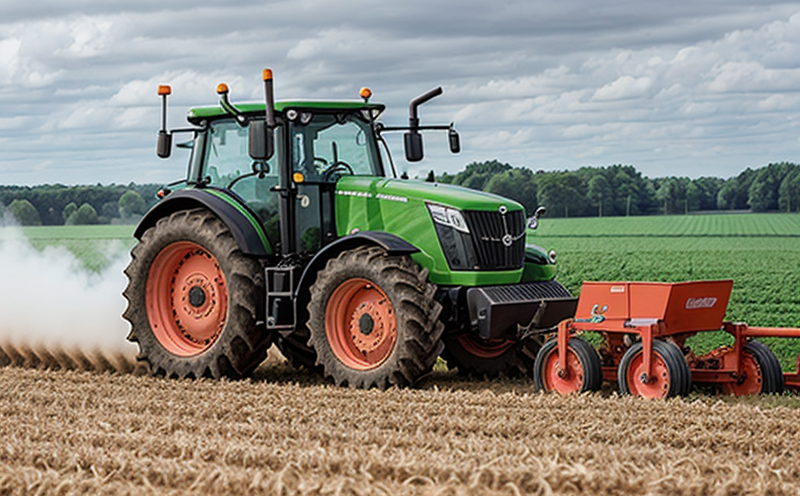Tractor Brake Performance Testing
The testing of tractor brake performance is a critical aspect in ensuring that agricultural machinery operates safely and efficiently. This service involves evaluating the braking system's ability to stop or decelerate the machine, which directly impacts the safety of operators and bystanders in agricultural settings.
Agricultural tractors are often used in environments where speed control is crucial, especially during field operations such as plowing, planting, or harvesting. The braking performance must be robust enough to handle sudden stops, sharp turns, and varying ground conditions. This testing ensures compliance with international standards like ISO 3801-2:2007, which provides guidelines for the determination of brake force.
The testing process begins by preparing the tractor according to specific protocols. The brakes are inspected visually for any visible defects or signs of wear and tear. The brake fluid is checked for contamination and replaced if necessary. After preliminary checks, the tractor undergoes a series of standardized tests under controlled conditions to measure its braking performance.
The test setup typically includes a skid pad where the tractor's braking capability can be assessed on both dry and wet surfaces. Acceleration and deceleration curves are plotted for comparison with manufacturer specifications. The test also evaluates the distribution of brake force between front and rear wheels, which is crucial in maintaining stability during braking.
The results are then analyzed to determine whether the tractor meets the required standards for safe operation. If discrepancies are found, corrective measures can be suggested based on the findings. This service not only ensures compliance with regulatory requirements but also contributes significantly to enhancing operator safety and reducing accidents in agricultural settings.
Benefits
Ensures compliance with international standards like ISO 3801-2:2007, enhancing the safety of tractor operations.
Identifies and rectifies any issues in brake performance early on, preventing potential accidents during field operations.
Improves overall efficiency by ensuring that tractors can perform their tasks reliably and safely under various conditions.
Reduces the risk of accidents, thereby enhancing operator safety and reducing liability concerns for agricultural businesses.
Industry Applications
The testing of tractor brake performance is applicable across a wide range of sectors within agriculture. It is particularly important in large-scale farming operations where the efficiency and safety of machinery can significantly impact productivity and cost management. This service ensures that tractors used for plowing, planting, harvesting, and other critical tasks meet the highest standards of safety and reliability.
For agricultural equipment manufacturers, this testing provides valuable insights into the performance characteristics of their products under real-world conditions. It allows them to make informed decisions about design improvements and quality control measures. Additionally, it helps in maintaining a positive reputation for product reliability among end-users.
Environmental and Sustainability Contributions
The testing of tractor brake performance contributes positively to environmental sustainability by promoting safe and efficient agricultural operations. By ensuring that tractors operate safely and reliably, we help reduce the risk of accidents which could lead to fuel spills or other environmental hazards.
Maintaining optimal braking performance also helps in reducing unnecessary wear and tear on machinery, extending its lifespan and minimizing resource consumption. This contributes to overall sustainability by supporting long-term operational efficiency and reducing waste.





